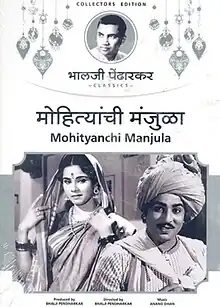| Mohityanchi Manjula | |
|---|---|
 Poster | |
| Directed by | Bhalji Pendharkar |
| Written by | Bhalji Pendharkar |
| Produced by | Bhalji Pendharkar |
| Starring | |
| Cinematography | Arvind Laad |
| Edited by | Baburao Bhosale |
| Music by | Anandghan |
Production companies | Jay Bhavani Chittra Jaiprabha Studio[1] |
Release date |
|
| Country | India |
| Language | Marathi |
Mohityanchi Manjula (transl. Manjula of the Mohite family)[2] is a 1963 Indian Marathi-language historical fiction[3] film directed by Bhalji Pendharkar who also provide story, screenplay and dialougues and produced by Jay Bhavani Chitra,[4] the film stars Suryakant, Jayshree Gadkar, Chandrakant, Baburao Pendharkar in the pivotal roles. The film plot follows a fictional story inspired from the life of Bahirji Naik, a secret agent of Chhatrapati Shivaji.[3]
The film was released on 1 May 1963.[2]
Cast
- Suryakant as Bahirji Naik
- Jayshree Gadkar as Manjula
- Chandrakant as Chatrapati Shivaji
- Raja Patwardhan as Kedarji
- Baburao Pendharkar as Hanumant
- Jaishankar Danve as Chandra Rao More
- Chittaranjan Kolhatkar as Ganya
- Shanta Tambe as Hamsa
- Raja Mayekar as Manjula's aunt
- Vasant Shinde
- Master Vitthal
- Indira Chitnis
- Shankar Kulkarni[5]
Production
The production work of the film is completed at the Jaiprabha Studio in Kolhapur.[6][7]
Release
Mohityanchi Manjula was released on 1 May 1963, coinciding with Maharashtra Day.[2] The film was the second picture of 1963 to become reasonably popular after Molkarin.[4]
Soundtrack
| Mohityanchi Manjula | |
|---|---|
| Soundtrack album by | |
| Released | 1963 |
| Genre | Feature film soundtrack |
| Length | 14:02 |
| Language | Marathi |
| Label | Saregama India limited |
| Official audio | |
| Mohityanchi Manjula - Full Album on YouTube | |
The music is composed by Anandghan (pseudonym used by Lata Mangeshkar) who also sung the songs along with her siblings Asha Bhosle, Usha Mangeshkar, and Hridaynath Mangeshkar.[8] Lata Mangeshkar also composed music for Ram Ram Pavhana (1960), Maratha Titka Melvava (1963), Sadhi Manse (1965), Tambadi Mati (1969) under the pseudonym Anandghan.[9][10][11] The lyrics was provided by Shanta Shelke and Jagdish Khebudkar while sound design is handled by Kaushik.[5]
All music is composed by Anandghan
| No. | Title | Lyrics | Singer(s) | Length |
|---|---|---|---|---|
| 1. | "Bai Bai Manmoracha" | Jagdish Khebudkar | Lata Mangeshkar | 3:22 |
| 2. | "Zala Sakharpuda - 1963" | Jagdish Khebudkar | Lata Mangeshkar, Usha Mangeshkar, Chorus | 3:31 |
| 3. | "Nilya Abhali" | Jagdish Khebudkar | Lata Mangeshkar | 3:04 |
| 4. | "Son Sakali Sarja" | Shanta Shelke | Lata Mangeshkar | 3:34 |
| Total length: | 14:02 | |||
References
- ↑ India (April 1963). The Gazette of India. Authority. Retrieved 2024-01-01.
- 1 2 3 Paik, Shailaja (2022-10-25). The Vulgarity of Caste: Dalits, Sexuality, and Humanity in Modern India. Stanford University Press. ISBN 978-1-5036-3409-1.
- 1 2 "Period dramas on Maratha warriors flavour of the season". Hindustan Times. 2019-11-24. Retrieved 2024-01-01.
- 1 2 Mujawar, Isak (1969). Maharashtra: Birthplace of Indian Film Industry. Chief Information Officer, Maharashtra Information Centre.
- 1 2 "Mohityanchi Manjula (1963)". Indiancine.ma. Retrieved 2024-01-01.
- ↑ "मोहित्यांची मंजुळा". मराठी चित्रपट सूची. Retrieved 2024-01-01.
- ↑ "Why Lata Mangeshkar's erstwhile Jayprabha Studio is at the centre of controversy". India Today. Retrieved 2024-01-01.
- ↑ Mishra, Yatindra (2023-01-30). Lata: A Life in Music. Penguin Random House India Private Limited. ISBN 978-93-5492-889-5.
- ↑ "Music composer 'Anandghan': A little-known side of Lata Mangeshkar". English Jagran. 2022-02-06. Retrieved 2024-01-01.
- ↑ Singh, Rajindra (2023-01-01). Goa Indian State. Guarav book center.
- ↑ Bharatan, Raju (1995). Lata Mangeshkar: A Biography. UBS Publishers' Distributors. ISBN 978-81-7476-023-4.